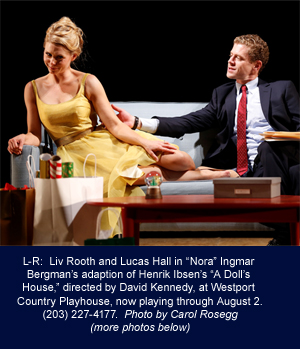
Connecticut Theater
"Nora"
Westport Country Playhouse
 It won’t fit. Riffing on Henrik Ibsen’s ground-breaking 1879 classic, “A Doll’s House,” the great Swedish director Ingmar Bergman’s 1981 “Nora” is like trying to force Cinderella’s slipper on her stepsister’s foot.
It won’t fit. Riffing on Henrik Ibsen’s ground-breaking 1879 classic, “A Doll’s House,” the great Swedish director Ingmar Bergman’s 1981 “Nora” is like trying to force Cinderella’s slipper on her stepsister’s foot.
Originally part of a trilogy consisting of adaptations of Strindberg’s ”Miss Julie” and Bergman’s own “Scenes From a Marriage” – also works about women under duress – “Nora,” at Westport Country Playhouse shifts emphasis from the universal concern about human beings seeking their places in society. Instead, we have a domestic soapie about a failing marriage. Well not quite a soapie since the 100-minute, intermissionless evening is almost completely devoid of even sentimentalized emotion.
Not that there’s anything inherently wrong about putting old wine in new bottles by adapting a prior work. But Bergman has trivialized the story, leeching its complexities. This Nora, unlike Ibsen’s, is hardly the put-upon caterpillar that eventually emerges from her cocoon. Her worse sin seems to be a severe case of flirtation-itis. She vamps everyone from her nemesis Nils Krogstad, from whom she’s borrowed money, to the effete Dr. Rank, who’s dying.
About that money: it embodies one of the evening’s most glaring anachronisms. Certainly, women today are hardly treated as equals in many countries. But saying “A wife can’t borrow without her husband’s consent” sounds strange in light of the play’s 20th -century setting.
Nora borrowed to pay for husband Torvald’s necessary health trip. More significantly, she forged her father’s signature on the promissory note. Now that’s a crime, particularly offensive since Torvald works in a bank and believes in not having debts and never borrowing.
In this version, Torvald doesn’t infantilize Nora to the point where she must rebel or lose herself. Nor does she live for her children who never appear and become unimportant. Bergman emphasizes sensuality, even sexuality, so that Nora’s final exit seems a result of a destructive connubial encounter than a lifetime of being patronized. Motivations throughout are vague and Nora appears too strong from the start to be under Torvald’s thumb.
More positively, director David Kennedy, with the help of Kristen Robinson’s minimalist sets and Matthew Richards’ moody lighting, creates an atmosphere of creeping dread. Fitz Patton’s mystery-laden sounds and music give more weight to the play than the play itself.
Liv Rooth, so good in WCP’s ”Loot,” again proves her mettle. Her Nora tenderizes the character’s putative dependency with flashes of rebellion. Despite her high heels, she’s no pushover. Lucas Hall’s Torvald is priggish, off-putting and a bit dense, while Shawn Fagan’s Nils seems quite reasonable and only mildly threatening. Stephanie Janssen is a sensible Mrs. Linde with LeRoy McClain as a frail Dr. Rank.
For all its attempts at profundity, “Nora” remains simplistic. For all its leaning towards passion, it remains as cold as a Norse winter.
--David A. Rosenberg
July 21, 2014




